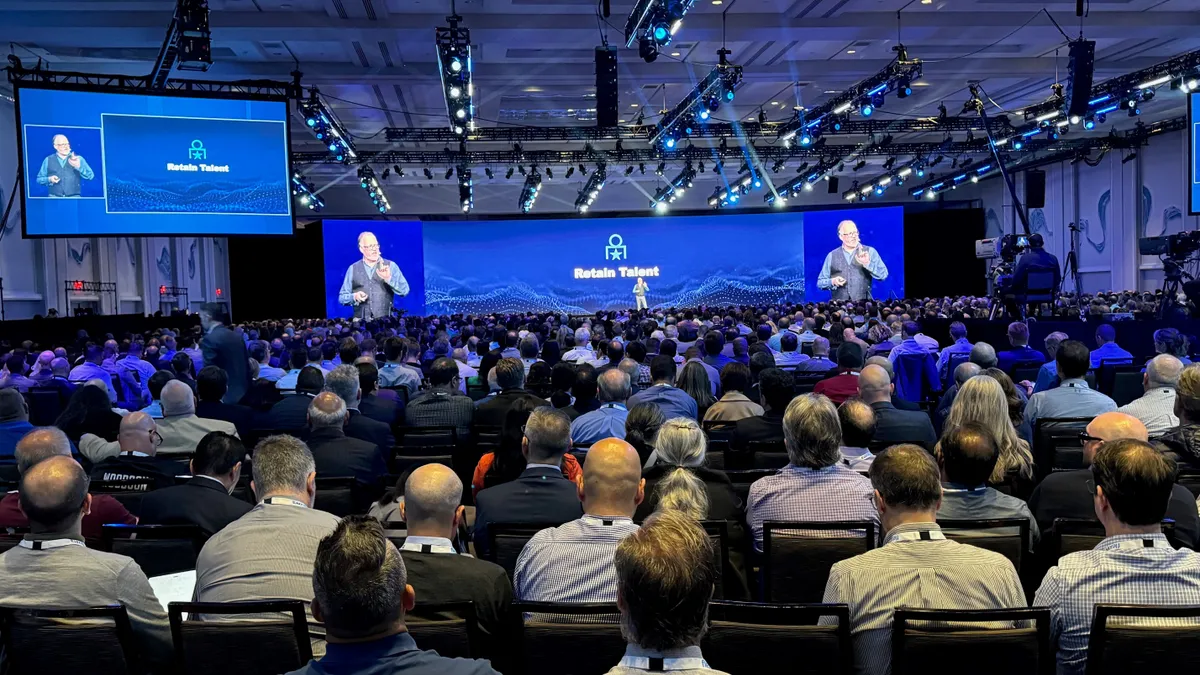After spending much of 2023 exploring where generative AI fits in their tech estates, organizations will look in the coming year to connect the technology to business strategy.
That's the key takeaway from Gartner's top strategic trends for 2024, unveiled Monday at the firm's annual IT Symposium/Xpo 2023.
“IT leaders are in a unique position to strategically lay down a roadmap where technology investments help their business's sustenance of success amidst these uncertainties and pressures," said Bart Willemsen, VP analyst at Gartner, in the announcement.
Alongside AI-driven concepts — such as the augmented-connected workforce and machine customers — the firm also expects broader adoption of industry-specific cloud platforms next year.
These are Gartner’s top strategic technology trends for 2024:
Democratized generative AI
The overarching theme in enterprise tech in 2023 has been quite clear: the impacts of generative AI loom large, and decision-makers must come to terms with where it fits into their tech stack.
Next year, Gartner expects, generative AI will continue its spread across the organization, as the barrier of entry to the technology continues to dissolve and vendors embed it across solutions.
Large language models will serve as a key driver of adoption, as they allow workers to access knowledge in a conversational style.
AI trust, risk and security management
IT leaders will need to erect AI security and privacy guardrails as adoption expands throughout the enterprise.
Gartner expects its framework of AI trust, risk and security management (TRiSM) to become more urgent in the coming year, citing the potential adverse effects of AI solutions left unchecked.
"Without guardrails, AI models can rapidly generate compounding negative effects that spin out of control, overshadowing any positive performance and societal gains that AI enables," the analyst firm said.
The framework, also present in last year's trends, brings security and governance inside the model, integrating necessary controls to stave off risk.
AI-augmented development
Vendors spent much of 2023 plugging AI-assisted technologies into their platforms, creating wholly new features or enhancing best-sellers. Software engineering, a critical process for any tech-driven business, stands to benefit from AI's efficiency.
AI-augmented development will continue to boost software engineers' output, letting them spend more time on strategic tasks and less time writing code, according to Gartner.
But adding AI to the software creation process brings challenges as well.
"Generative and other types of AI offer new opportunities and drive several trends," said Chris Howard, distinguished VP analyst and chief of research at Gartner, in the announcement. “But deriving business value from the durable use of AI requires a disciplined approach to widespread adoption along with attention to the risks.”
Intelligent applications
As part of the ongoing vendor push to infuse AI into services, more applications will become what Gartner defines as intelligent applications — apps able to respond appropriately and autonomously thanks to learned adaptation.
"As a foundational capability, intelligence in applications comprises various AI-based services, such as machine learning, vector stores and connected data," the report said. "Consequently, intelligent applications deliver experiences that dynamically adapt to the user."
Augmented-Connected Workforce
The talent crunch is likely to persist into 2024 across a variety of roles. To boost the value each employee can provide, Gartner expects technology leaders to enable an approach they call the augmented-connected workforce.
This strategy relies on intelligent applications and workforce analytics to offer workers context and guidance. One-quarter of CIOs will turn to this strategy over the next four years to lower time to competency by 50% for key roles.
Continuous threat exposure management
Guarding against cybersecurity attacks will continue to consume resources next year. Gartner expects businesses to focus on continuous threat exposure management, a systemic approach that lets companies evaluate the exposure of their digital and physical assets on an ongoing basis.
Machine customers
AI will boost the speed and efficiency of organizations next year and, in the process, it will also become a considerable economic actor.
As algorithms gain the ability to assess and execute purchases for organizations and individuals, the rise of the machine customer is expected to lead to "trillions of dollars in revenues by 2030," Gartner said.
Sustainable technology
Increased global interest in environmental, social and governance issues will put business decisions under greater scrutiny, especially amid the expectation of sharper government oversight.
The trend will impact tech decisions, according to Gartner, drawing more attention to the sustainability indicators associated with energy-heavy technologies, including AI and cloud computing.
Platform engineering
Technology leaders are expected to lean into platform engineering next year, the discipline of running self-service internal development platforms. This category of technology can enhance productivity, improve user experience and accelerate the attainment of business value.
Industry cloud platforms
As computing needs become more connected to daily operations, more organizations will adopt industry-cloud platforms to enhance their business outcomes, Gartner expects.
Already a trend among large cloud providers, industry verticals are tailored solutions that address sector needs and can be customized to a company's specific demands.





















